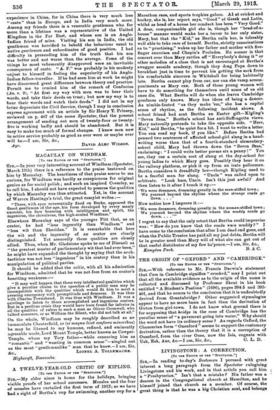MACAULAY ON WINDHAIL
ETO THE EDITOR OF THE " :SPICTATOR."]
‘Srit,—In your very interesting account of Windham (Spectator, March 15th) there is a reference to the praise bestowed on him by Macaulay. The heartiness of that praise seems to me curious, for Windham was hardly as conspicuous for original genius as for social polish ; and such an inspired Coverley, so to call him, I should not have expected to possess the qualities by which Macaulay was thus attracted. Yet, in the account of Warren Hastings's trial, the great essayist writes :— "There, with eyes reverentially fixed on Burke, appeared the nest gentleman of the age, his form developed by every manly
• exereise, his face beaming with intelligence and spirit, the ingenious, the chivalrous, the high-souled Windham."
Elsewhere Macaulay says of the younger Pitt that, as an orator, he had "less ingenuity than Windham" and "less wit than Sheridan." It is remarkable that here ,the wit and the ingenuity of an orator are clearly
-distinguished. Yet assuredly these qualities are closely allied. Thus, when Mr. Gladstone spoke to me of Disraeli as " the greatest master of parliamentary wit that had ever been," he might have expanded the thought by saying that the arch. tactician was not less "ingenious" in his oratory than in his manipulation of political parties.
It should be added that the critic, with all his admiration for Windham, admitted that he was not free from an orator's besetting weakness :—
"It may well happen that those very intellectual qualities which give a peculiar charm to the speeches of a public man may be incompatible with the qualities which would fit him to meet a pressing emergency with promptitude and firmness. It was thus with Charles Townshend. It was thus with Windham. It was a privilege to listen to those accomplished and ingenious orators. But in a perilous crisis they would have been found far inferior in all the qualities of rulers to such a man as Oliver Cromwell, who talked nonsense, or as William the Silent, who did not talk at all."
On the whole, Windham may be roughly described as an immaculate Chesterfield, or (si magna licet conferre minoribus) be may be likened to my humane, refined, and eminently agreeable uncle, Lord Mount Temple, better known as Cowper. Temple, whom my Tory father—while censuring him as "romantic" and "wanting in common sense "—singled out as the most " gentlemanlike " man that be knew.—I am, Sir,
Highcroft, Boscombe.










































 Previous page
Previous page